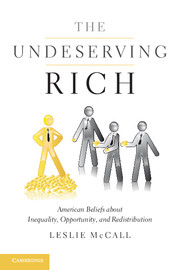Book contents
- Frontmatter
- Contents
- Tables and Figures
- Preface and Acknowledgments
- Introduction: Thinking about Income Inequality
- 1 Beyond the Opposition between Opportunity and Inequality
- 2 The Emergence of a New Social Issue
- 3 American Beliefs about Income Inequality
- 4 Why Do Americans Care about Income Inequality?
- 5 Americans' Social Policy Preferences in the Era of Rising Inequality
- Conclusion: A New Era of Beliefs about Inequality
- Notes
- References
- Index
Preface and Acknowledgments
Published online by Cambridge University Press: 05 April 2013
- Frontmatter
- Contents
- Tables and Figures
- Preface and Acknowledgments
- Introduction: Thinking about Income Inequality
- 1 Beyond the Opposition between Opportunity and Inequality
- 2 The Emergence of a New Social Issue
- 3 American Beliefs about Income Inequality
- 4 Why Do Americans Care about Income Inequality?
- 5 Americans' Social Policy Preferences in the Era of Rising Inequality
- Conclusion: A New Era of Beliefs about Inequality
- Notes
- References
- Index
Summary
Despite the title, this book is not about bashing the rich. When I first started studying how Americans think about economic inequality, in the late 1990s, and happened upon this title midway through the following decade, it was uncommon to put the rich at the center of analysis. They attracted little of the attention that was routinely showered on the poor. But the notion that the rich are worthy of detached investigation and informed criticism, like the poor, is becoming more acceptable. This does not mean, however, that we ought to fall into the same trap that often plagues the study of the “undeserving poor.” Singling out any group often leads to a pathologizing of that group, and this tends to obscure how the group fits into the rest of society. This book is about how the rich fit into Americans’ understanding of inequality and opportunity, in ways that characterize the rich as both productive and unproductive members of society, and thus both deserving and undeserving of their riches.
A central thesis of this book, which seems at once more plausible today than it did when I first began to formulate it, and yet still contrary to ingrained notions of the American dream, is that beliefs about economic inequality are shaped by views about the rich and not the poor (who are more central to beliefs about poverty). Not long ago, when attention was more heavily focused on the poor, poverty, and welfare, the escalation of economic inequality had yet to be fully recognized.
Information
- Type
- Chapter
- Information
- The Undeserving RichAmerican Beliefs about Inequality, Opportunity, and Redistribution, pp. xi - xviiiPublisher: Cambridge University PressPrint publication year: 2013
